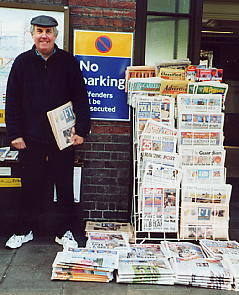
That's the title of my April media column - which I wrote a full four weeks before the Chicago Sun-Times joined the Chicago Tribune in filing for bankruptcy protection.
My article is about my own career and February's Journalism Town Hall, in which a who's-who of both working an out-of-work journalists (mostly the latter) discussed the fate of newspapers.
An excerpt:
I earned a master’s degree in public affairs reporting at Columbia College, where we spent an afternoon at the now-defunct City News Bureau, the cooperative news agency that provided news to member media outlets. That day, Managing Editor Paul Zimbrakos told us there were more students in journalism school than working journalists, and to get out now. I didn’t listen....
...I lost the Reader gig in 2004, amid a redesign sparked by the local launch of Time Out magazine. Now, I write part time and teach yoga full time.
I was in good company at the Town Hall, where the audience was full of current and former journalists - as was the panel, which ranged from Chi-Town Daily News founder Geoff Dougherty to former Sun-Times reporter Lee Bey.
The subject was the future of journalism, which has been shedding reporters like bad mortgages. John Callaway said newspapers as we knew them are dead, and it was suggested publications such as the Huffington Post that use and comment on content from traditional print media should pay for its use. Panelist Carol Marin called it "content without compensation."
Huffington Post Chicago's editor, Ben Goldberger, said his stories drive "tons" of readers to the papers' Web sites and pointed to the staggering number of comments the stories generate. "It's not just news," he said. "It's a dialog."
Callaway suggested a foundation be created that pays journalists to report the news, at least until a new model is found. "It is about creating an environment where journalism could flourish," said panelist Feder. This model would require editors and infrastructure as well as beat and investigative reporters - which would be expensive.
Andrew Huff pointed out Gapers Block, which uses volunteer writers, costs him just $100 per month for the server. Dougherty also runs his nonprofit Web site on a shoestring.
Audience member and former broadcast journalist Carolyn Grisko suggested readers make micro-payments to read articles, or that newspapers adopt the cable-TV subscription model.
But the best moment came when the Tribune's Eric Zorn noted that someone in the room had been unfavorably live-Tweeting the proceedings, and asked him to speak up. It was Angryjournalist.com founder Kiyoshi Martinez, who said newspapers must reinvent how they advertise. Instead of burying tiny ads on a busy Web page, they should copy Gawker.com, whose ads are large, singular and hard to miss -- not to mention profitable.
Locals can watch the Town Hall in its entirety today (April 3) at noon on CAN TV21.
*Ironically, the associate editor of the mag where this article appeared was fired the day after it came out. And on Monday I learned that Conscious Choice magazine (where I was once a yoga columnist) will cease publishing - although a group of staffers is planning a May 1 launch of something called Modern Metropolis magazine.... The Reader's parent company, Creative Loafing, is still in Chapter 11. Like Conscious Choice, this formerly-local mom-and-pop publication was snapped up in the mid-00's by an out-of-town interest that hastened its march towards the grave.
CK,
ReplyDeleteYou might like this blog, Dan Kennedy's Media Nation. It's written by a journalism professor at NU and he's been thoroughly covering the 'future of news' meta-story.